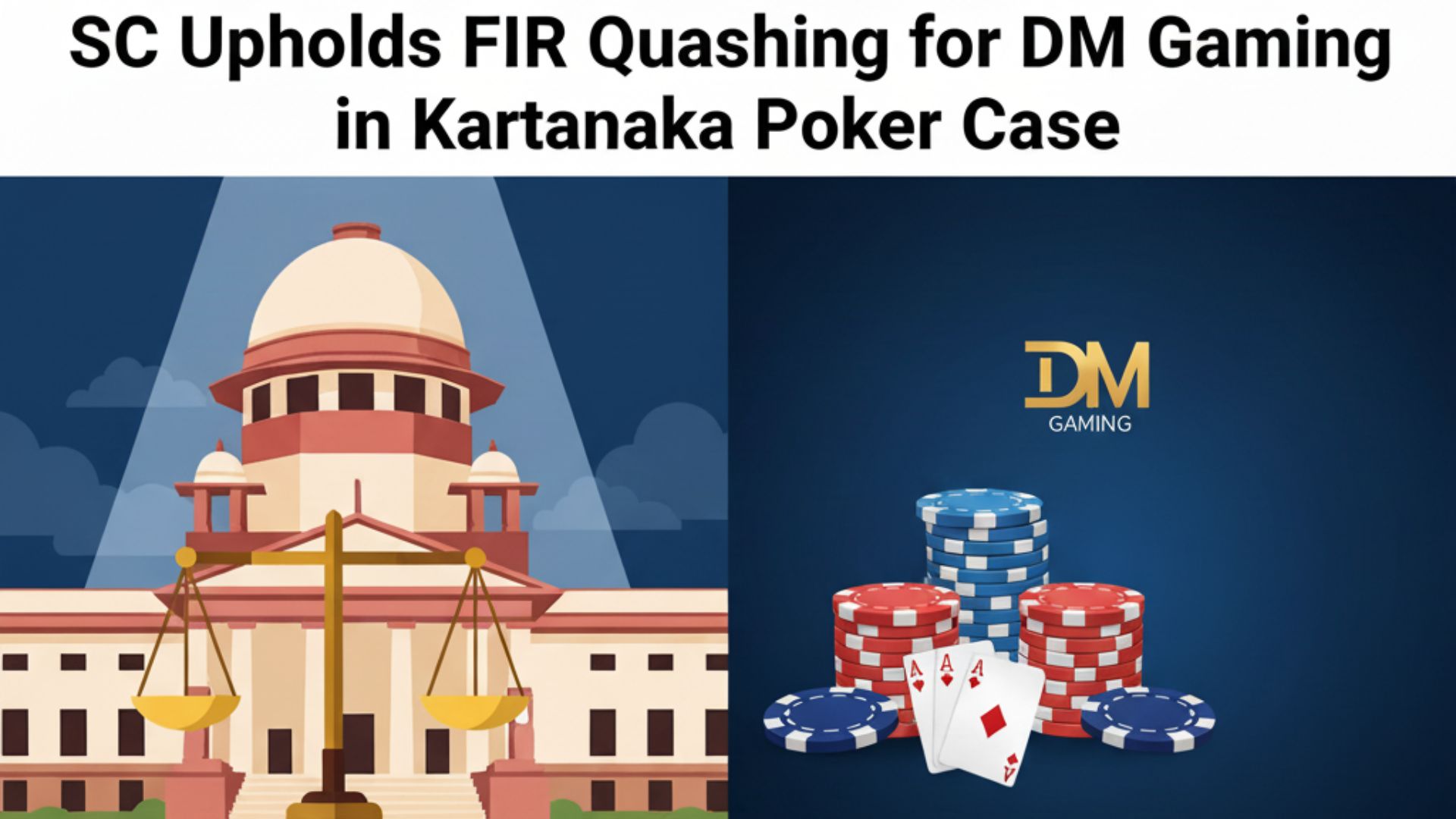 Supreme Court Upholds Quashing of FIR Against DM Gaming in Karnataka Poker Club Case
Supreme Court Upholds Quashing of FIR Against DM Gaming in Karnataka Poker Club Case
Apex Court Dismisses Karnataka Government’s Plea Against High Court Order
Ruling Seen as Major Boost for Online and Offline Skill-Based Gaming Industry
By Our Legal Reporter
New Delhi: September 29, 2025: In a significant judgment for India’s gaming industry, the Supreme Court of India has rejected the Karnataka government’s challenge to a Karnataka High Court order that had quashed a First Information Report (FIR) against DM Gaming Private Limited, a company running a poker club in Bengaluru. The ruling, delivered last week, is being seen as a landmark moment in the ongoing debate over whether poker and similar games fall under the category of “games of skill” or “games of chance.”
The decision not only provides relief to DM Gaming but also strengthens the legal position of companies operating in the skill-based gaming sector across India.
Background of the Case
The case began when the Karnataka Police registered an FIR against DM Gaming, alleging that the company was running a gambling operation under the guise of a poker club. The FIR was filed under provisions of the Karnataka Police Act, which prohibits gambling and betting activities.
DM Gaming challenged the FIR before the Karnataka High Court, arguing that poker is a game of skill and not gambling. The High Court agreed with the company’s position and quashed the FIR, ruling that the police had acted without sufficient legal basis.
Unhappy with this decision, the Karnataka government approached the Supreme Court, seeking to overturn the High Court’s order.
Supreme Court’s Decision
The Supreme Court bench dismissed the state’s appeal and upheld the High Court’s ruling. By doing so, the Court effectively confirmed that the FIR against DM Gaming was not sustainable.
While the Supreme Court did not issue a detailed judgment on whether poker is definitively a game of skill, its refusal to interfere with the High Court’s decision is being interpreted as a positive signal for the gaming industry.
Why This Matters
The ruling is important for several reasons:
- Legal Clarity for Gaming Companies: The decision provides relief to operators of poker clubs and online platforms, who often face legal uncertainty due to varying state laws.
- Boost for Skill-Based Gaming: The judgment strengthens the argument that games like poker, rummy, and fantasy sports involve skill and should not be treated as gambling.
- Impact on State Laws: Karnataka had earlier attempted to ban online gaming through amendments to its Police Act in 2021, but those provisions were struck down by the High Court in 2022. The Supreme Court’s latest decision further weakens the state’s position.
Industry Reactions
Industry experts and gaming associations have welcomed the ruling. Many believe it will encourage investment and innovation in India’s rapidly growing online gaming sector, which is projected to reach billions of dollars in market value over the next few years.
Legal analysts point out that the judgment aligns with earlier Supreme Court precedents that recognized rummy and horse racing as games of skill.
Broader Legal Context
The debate over gaming laws in India has been ongoing for decades. While gambling and betting are prohibited under most state laws, the courts have consistently drawn a distinction between games of chance and games of skill.
- Games of Chance: Outcomes depend largely on luck (e.g., lotteries, roulette).
- Games of Skill: Outcomes depend on knowledge, strategy, and practice (e.g., rummy, chess, poker).
The Supreme Court has previously held that games involving substantial skill cannot be classified as gambling, even if they involve monetary stakes.
Implications for the Future
The ruling could have far-reaching consequences:
- Encouragement for Startups: More gaming startups may enter the market, confident that courts will protect skill-based games.
- Pressure on States: States like Tamil Nadu, Telangana, and Andhra Pradesh, which have attempted to ban online gaming, may face renewed legal challenges.
- Consumer Protection: The judgment may push governments to regulate rather than ban gaming, focusing on responsible play, age restrictions, and anti-addiction measures.
Conclusion
The Supreme Court’s rejection of Karnataka’s appeal marks a turning point for India’s gaming industry. While the legal battle over the definition of gambling versus skill-based gaming is far from over, this ruling provides much-needed clarity and relief to operators like DM Gaming.
As India’s digital economy grows, the gaming sector is expected to play a major role in entertainment, employment, and revenue generation. The Court’s decision may well pave the way for a more balanced regulatory framework that distinguishes between illegal gambling and legitimate skill-based gaming.